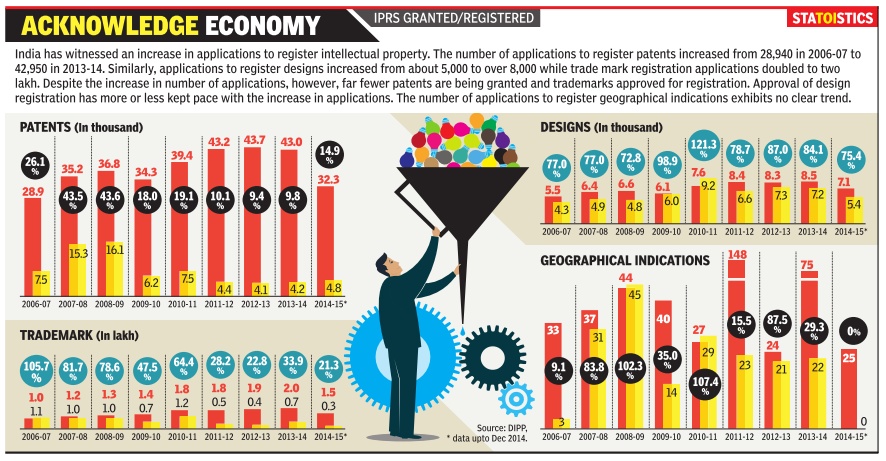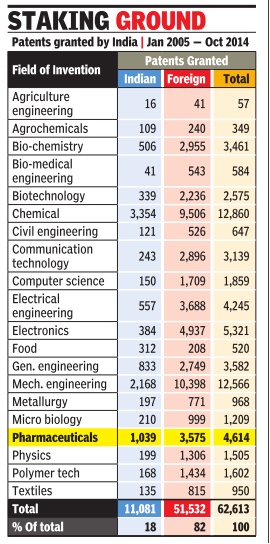Patents: India
(→Patents granted by India: 2005- 14) |
|||
| Line 65: | Line 65: | ||
While India is currently in the process of finalizing an IPR policy and a separate policy for pricing of patented medicines in the country, bilateral talks between the two nations along with Obama's visit to India assume significance not only for the Indian pharma industry but for patients across the world. | While India is currently in the process of finalizing an IPR policy and a separate policy for pricing of patented medicines in the country, bilateral talks between the two nations along with Obama's visit to India assume significance not only for the Indian pharma industry but for patients across the world. | ||
| + | =Intellectual property, India: 2006-15= | ||
| + | [[File: 2006-15, the registration of patents, trademarks, geographical indications and designs in India, applications and approvals.jpg|2006-15: The registration of patents, trademarks, geographical indications and designs in India: Applications and approvals; Graphic courtesy: [http://epaperbeta.timesofindia.com/Gallery.aspx?id=07_10_2015_009_017_002&type=P&artUrl=STATOISTICS-ACKNOWLEDGE-ECONOMY-07102015009017&eid=31808 ''The Times of India''], October 7, 2015|frame|500px]] | ||
Revision as of 15:27, 8 October 2015
Patents in India
Title and authorship of the original article(s)
|
West should learn from India’s high patent standards By SA Aiyar, The Times of India, 7 April 2013 |
This is a newspaper article selected for the excellence of its content. |
The [Indian] Supreme Court’s denial of a patent for Glivec, an anti-leukaemia drug made by Novartis of Switzerland, has been widely but wrongly hailed by NGOs and castigated by pharmaceutical companies as an attack on patents and a victory for cheap medicine. Actually, the Court fully upheld the principle of patents, but set a high bar for deciding what’s innovative and what’s mere tweaking.
Till 1995, India refused to patent drug molecules. But as a consequence of WTO membership, India in 2005 allowed product patents for drugs, but only for innovations after 1995. This meant no patent for Glivec, which was patented first in 1993. To get around this, in 2006 Novartis tried to patent a new variation of Glivec, for which it claimed improved efficacy. Some other countries granted patents for this variation. But the Indian Patents Office rejected the claim as insufficiently innovative. So too has the Supreme Court.
Many NGOs hailed the judgment for the wrong reason. The Cancer Patients Aid Association, which led the fight against Glivec, declared: “We are happy that the apex court has recognised the right of patients to access affordable medicines over profits for big pharmaceutical companies through patents.”
False: no such right was recognized by the court. It simply said Novartis had not proved that the new variation was innovative enough. The court clarified that it would grant patents for variations that were more efficacious, but set a higher standard for proof than many western courts do.
NGOs are wrong to paint Novartis as a bloodsucker that pauperizes patients. Glivec has saved lakhs of leukaemia patients from death. This is a great boon, and we must encourage more such life-saving boons by granting patents for new drugs. However, this does not mean giving patents for mere tweaking and “evergreening” of existing drugs through minor variations.
Patents are supposed to spur innovation, but when granted over-liberally they create so much lawsuit risk and cost that they end up hampering innovation, not aiding it. The Economist (UK), no basher of multinationals, acknowledges that over-liberal proliferation of patents fuels many of the American patent system’s broader problems, such as patent trolls (speculative lawsuits by patentholders who have no intention of actually making anything); defensive patenting (acquiring patents mainly to pre-empt the risk of litigation, which raises business costs); and “innovation gridlock” (the difficulty of combining multiple technologies to create a single new product because too many small patents are spread among too many players).”
Patent trolls buy up patents in bulk, typically from bankrupt companies, not for actual use but simply to hit other innovators with lawsuits for patent infringement, forcing them to settle to avoid fat legal bills. One US study estimated such legal costs at $ 29 billion in 2011 alone.
Last year, Google bought Motorola’s failing smartphone business for $ 12.5 billion, to access its 17,000 patents. Microsoft and others paid $ 4.5 billion for 6,000 patents from Nortel. Most of these will never be used in actual production: they are simply kept as legal weapons for possible lawsuits. This has nothing to do with innovation, which patents are supposed to promote.
The West’s over-liberal patent system is broken. It should learn from India’s much tougher system. Patents should be seen as monopolies, to be given sparingly only for genuine innovations where the public benefit clearly exceeds the monopoly cost. This means setting a high bar for innovation. High standards are desirable for patents, as for everything else.
Patents granted by India: 2005- 14
Jan 27 2015, Sushmi Dey
Promote Indian drugs, US health groups urge Obama
Leading US health groups including AVAC, Oxfam America, amfAR, Health Global Access Project (GAP), TAG (Treatment Action Group)and others have written to Barack Obama urging him to support India in providing “high-quality, low-cost generic medicines essential for health care around the world“. This comes in the wake of the two nations agreeing to enhance engagement on IPR at the latest bilateral talks. The joint statement after the Obama Modi meeting said the two countries expressed interest in sharing information and best practices on IPR, and reaffirmed commitment to stakeholders' consultations on related policy matters.
There are concerns that US is pressuring India to push for liberal policies in favour of pharma MNCs seeking patent protection for their products in India.
“Instead of using your trip to promote the narrow interests of one segment of the pharmaceutical industry, we ask you to support the interests of people who need affordable medicines, whether they live in the US, in India, in Africa or elsewhere,“ civil society organizations said in the letter.
In April, the US brought out the Special 301 report taking unilateral measure to pressure countries to accept IPR protection beyond WTO obligations. The report classified India as a `priority watch list country' , highlighting concerns related to Indian patent law, grant of compulsory licence and inclusion of a statement relating to CL for green technologies in India's manufacturing policy .
Adding Indian laws are compliant to the WTO TRIPS agreement, the civil society letter said, “Recent US policy stances have sought to topple parts of India's intellectual property regime that protect public health to advance interests of multinational pharmaceutical corporations in longer, stronger, and broader exclusive patent and related monopoly rights.“
India is a major manufacturer and exporter of low cost generic medicines. The domestic pharmaceutical industry registered exports worth $14.84 billion in the 2013-14. While the US itself contributes the majority of this sales, India is also a major supplier of generic medicines to other parts of the world.
While India is currently in the process of finalizing an IPR policy and a separate policy for pricing of patented medicines in the country, bilateral talks between the two nations along with Obama's visit to India assume significance not only for the Indian pharma industry but for patients across the world.
Intellectual property, India: 2006-15

